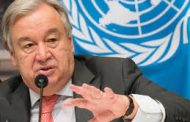The signing of a peace agreement between the Transitional Government of Sudan (TG) and some of the (armed) opposition movements in Juba (in August 30, 2020) is a vital threshold and a promising step for a comprehensive and lasting peace in the near future.
The agreement which has been reached after ten-month-long talks, and which was initialized by the TG and the Revolutionary Front, covers eight protocols of: security, land, transitional justice, reparation, compensations, development of the nomads sector, wealth sharing and power sharing. The agreement included respect of religious and cultural diversity and the positive differentiation for the war-torn areas. The celebration which was honored by General Adull-fattah Al-Burhan, Dr. Hamdok, besides President of South Sudan Gen. Salva Kiir, is expected to end a 17-year-long war between (part of the) movements and the central government. The signatories included the components of the ‘Revolutionary Front'(RF): the People’s Liberation Movement/North (led by Malik Aqar), Justice and Equality Front (led by Jibreel Ibrahim) and Sudan Liberation Movement (led by Minni Arko Minawe). Negotiations were divided into five tracks: Darfur region (Western scetor), the states of the Blue Nile and South Kordofan (the Southern sector), the sector of East Sudan, the sector of North Sudan and the sector of the Middle Sudan.
The signatories (the RF) are to get three seats in the Council of Sovereignty, five seats in the Council of Ministers and 75 in the would-be parliament (the Legislative Council). The provisos of the Agreement also include the appropriation of 40% of the tax revenues besides the local wealth and resources to the states. According to the Agreement a joint military force will be formed from the Sudan army, the police, the Rapid Support Forces, to maintain security in Darfur states and the ‘two areas’ (i.e. the Nuba area of South Kordofan and the Blue Nile). The armed opposition movements (signatories to the agreement) will form 30% of this joint force. A period of 39 months has been fixed to the process of Demobilization, Deployment and Rehabilitation.
However, the agreement which includes the termination of war, involves the extension of the transitional period beyond the prescribed 39 months. This may not be good news as the Sudanese people are yearning for elections to take place as soon as possible, any further delay might not be acceptable.
One of the shortcomings of the agreement is that at least two of the most powerful armed movements have not joined the agreement – notably: the Sudan Liberation Movement (led by Abdul-Wahid Muhammad Nur) and the Sudanese People Liberation Movement/North faction, Nuba (Led by Abdul-Azeez Al-Hilo). This means peace seems to be not yet attainable by the recent Juba Agreement.
It is regrettable that as the Sudanese people are suffering a day after another from expensive cost of living and ever increasing prices of all goods, the TG is increasing seats and posts in the government apparatus to ‘reward’ the signatories! at the time it is expected to pursue great cut down in public spending.
https://khartoum-today.net/
 Sudan army chief Al Burhan freezes bank accounts of paramilitary RSF
Sudan army chief Al Burhan freezes bank accounts of paramilitary RSF Sudan’s SAF & RSF sign agreement intended to lay groundwork for humanitarian assistance
Sudan’s SAF & RSF sign agreement intended to lay groundwork for humanitarian assistance SAF, RSF agree on extension truce for the sixth time
SAF, RSF agree on extension truce for the sixth time Army, RSF agree to extend truce for 72 hours
Army, RSF agree to extend truce for 72 hours Sudanese people fled to Egypt amid acut humanitarian crisis
Sudanese people fled to Egypt amid acut humanitarian crisis THE ELEPHANT IN THE ROOM
THE ELEPHANT IN THE ROOM Death toll from Sudan fighting tops 180 as clashes in Khartoum enter fourth day
Death toll from Sudan fighting tops 180 as clashes in Khartoum enter fourth day By the UN Secretary-General Op-ed on G20 – 8 billion
By the UN Secretary-General Op-ed on G20 – 8 billion A strong military key to maintaining world peace
A strong military key to maintaining world peace Beautiful China shows new chapter of ecological conservation
Beautiful China shows new chapter of ecological conservation

PEACE PACT: A STEP AHEAD, BUT…
About the author
Related Articles
2020 All rights reserved khartoum-today.net 0124293222







